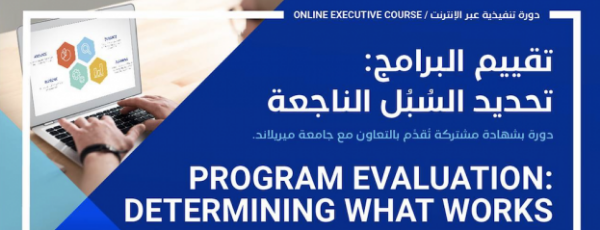Thank you for your message. The IPPA team will get back to you shortly. You first need to login here.



The University of Maryland School of Public Policy (UMD) and Hamad bin Khalifa University (HBKU) are proud to offer a three-day executive course titled “Program Evaluation: Determining What ‘Works.’" Classes will be held in virtually (via WebEx) from Doha, Qatar from May 24--26, 2021 at HBKU.
Governments, nonprofits, funders, and multinational organizations increasingly want rigorous evidence about the operations and effectiveness of their programs, systems for monitoring programs on an ongoing basis, and mechanisms for utilizing this information for program improvement and planning. Meeting these demands requires specialized knowledge.
This course will provide participants with the tools needed to assess evaluations of existing public and private programs as well as to plan, procure, and manage new evaluations. Topics will include the idea of causal attribution, the “counterfactual,” and the main techniques for measuring a program's effectiveness (including case studies, pre/post comparisons, comparisons to others, randomized control trials, econometric evaluations, and natural experiments), and, considerations for drawing policy conclusions (with a discussion of generalizability and the statistical and policy significance of evaluation findings).
Faculty
Core faculty will include:
Dr. Douglas Besharov, a Professor at the University of Maryland School of Public Policy, former President of the Association for Public Policy Analysis and Management, and Administrator of the Peter H. Rossi International Award for Contributions to the Theory or Practice of Program Evaluation.
Dr. Anis Ben Brik, an Associate Professor and founding director of the Program for Social Policy Evaluation and Research (PROSPER) at Hamad Bin Khalifa University’s (HBKU) College of Public Policy (CPP) and a member of Qatar Foundation for Education, Science and Community Development.
Dr. Douglas Call, Deputy Director of the University of Maryland Center for International Policy Exchanges and an adjunct lecturer at the University.
The faculty will be augmented by guest faculty who are luminaries in the field of program evaluation:
Dr. David Myers, the President and CEO of the American Institutes for Research, one of the world’s largest behavioral and social science research and evaluation organizations. He is a leading authority on the design, implementation, and analysis of experimental studies of education programs.
Dr. Anu Rangarajan, a Senior Vice President and the director of climate change at Mathematica Policy Research, one of the world’s leading firms engaged in policy research. In her role, she leads the development of innovative, sustainable solutions that help combat the effects of climate change and make vulnerable communities more resilient.
Dr. David Seidenfeld, Vice President the for International Research and Evaluation at the American Institutes for Research. He has extensive experience designing and implementing evaluations of economic, health, and education programs.
Course Schedule
The course will meet daily from 16:00-19:30 ADT (9:00-12:30 EDT) from Monday, May 24 to Wednesday, May 26. A projected schedule can be found on the course webpage.
Classes will be conducted in English with simultaneous Arabic subtitles. The format will be virtual with proceedings conducted through WebEx.
Upon completion of the program, participants will receive a joint certificate of participation from UMD and HBKU.
Course Cost
The cost of the course is USD 1,500. In case of cancellation, the entirety of the cost may be refunded.
Registration
Applicants can register for the course at the HBKU website.


Thank you for your message. The IPPA team will get back to you shortly. You first need to login here.